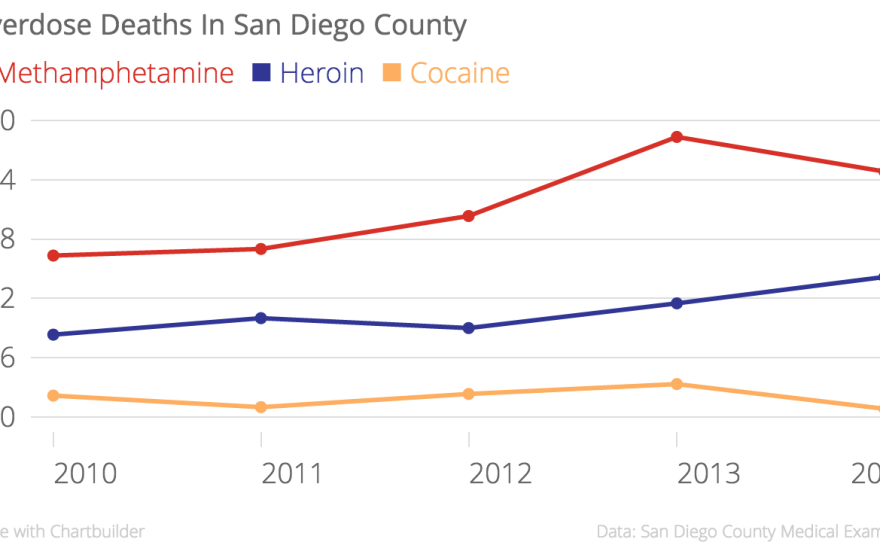Methamphetamine is an extremely dangerous drug that is highly addictive. Long-term use can cause brain damage and other devastating health problems. The final episode of a three-part series, KPBS Kenny Goldberg takes a look at one treatment program helping hard-core meth addicts get clean and sober. José Escobedo is 36 years old. When he was a little kid he got his first taste of methamphetamine. That is when his life went into the toilet. I was smoking drugs. I smoked all the way to 23 years old. When I was 20 years old, was introduced to shooting up crystal meth. I set of crystal meth for 34 years old. What does he have to show? One heck of a rap sheet, assault with a deadly weapon, DUI, hit-and-run, burglary. His latest arrest was in January 2014. The prosecutor gave him a choice, go back to prison for 12 years or tried to kick is meth habit. I was living the last three years with no responsibility. My disease was what control my life. We are in a drug court 12-step meeting. These men have serious criminal records. As part of the recovery process, they are encouraged be brutally honest about their addiction. After the main share their stories, a counselor weizen. -- Ways and. They have to live a life without drugs. It is a new way of life. The concept of the program to -- it is a district attorney, public defender, case management treatment team. Daniel Stone says people convicted of nonviolent drug offenses are eligible for drug court. There are four of them in San Diego County. Or than 1600 nationwide. These are not Hollywood celebrity Country Club rehab programs. And drug court, attics go through 18 months of hard work and constant supervision. They are required to go to 12-step meetings five days a week, get individual counselor, and get a job. If they test 30, they go to jail. It depends on how many times it happened. If they scrape enough times, attics have to serve their original sentence. County officials say 90% of drug court graduates remain a rest free -- remain arrest free two years after complaining the program. He says it has given them the support to clean up his act curriculum that he had to take responsibility. There was a lot of things I needed to do. You cannot be in denial about things. It is graduation night for participants and drug court. The drug coach -- judge welcomes them to the stage. Some of the graduates cry and credulous that they made it through the program. José Escobedo takes the stage. Talk about success. For the first time since he was a little kid, he is not 18 months -- now 18 months completely clean and sober. My family has witnessed that I heard them a lot. I plan on staying clean and doing what I have to do to stay clean and keep making them happy. They are all here. My wife and my kids are here. My sister, my grandma, my cousins. Then he makes his closing remarks. I'm happy with everybody who was in the program. I was able to interact with a lot of people who mattered. I made clean trance. It is something different than going back to the old neighborhood and old ways. It is a new way of life. I plan on staying in a will be staying clean. I think you guys all. Kenny Goldberg, KPBS news. Joining me now is Patrick Foley community outreach coordinator for the nonprofit McAlister Institute. It is an alcohol and drug treatment center in San Diego. Thank you for having me. The series ended on a wonderfully optimistic note, applause, tears. We can also hear that there is an awful lot of work in pain that goes into conquering and addiction to meth. How difficult is it? Extremely difficult. Attics spend -- attic spend long periods of time focusing on themselves and their use and crime, especially if they are addicted to methamphetamines. They cannot seem to get out of it. They live in a delusional state of mind. It is hard for them to go to know structure to structure. How does that work? How do you focus on structure when you focus on no responsibility? Being in a drug center we have to be in group 5 days a week and then after the group you have to go to a 12-step meeting and talk about your feelings. When you weigh out the pros and cons, a lot of times they relapse because they are not ready for change. I was reading the statistic on people to stay sober. It ranges from about 5% who do that without help to about 12% it with counseling. That is upsetting. How does counseling help? I think it gets them out of their delusional state of mind and it helps them with structure. If they are ready to change, 12-step programs work for people who wanted. If it was for people who need it, think everybody would be clean and sober. It is really for the people who wanted. Sometimes the 12% is people who did successful while they were at McAlister Institute. When they left they did not have wraparound services for the do not follow the directions of the councilors and the drug treatment councilors that were there. All of the support is there. They'll even if they are not ready to change they go back to the all places, people, and things. That is what we just heard. A graduate was said that I met new people now. Is that one of the major challenges of staying clean? Absolutely. Finding new friends and their friends that they have before weren't real friends. They hang on while you have drugs and alcohol. What you're looking for is a new support group that will not care how you feel. They went to help you survive. They will tell you things that you need to hear like going to meetings and making sure that you are following up with probation. Drug court and programs like McAlister works so well because it is every day, Monday through Friday. You don't get any breaks. How about when ants? It is tough. If they have a support group, which people at McAlister group help with, they take the steps and continuing with a 12-step program, we see a lot of success. When they don't, they are punching their ticket while they are there waiting for the day to get out. What are the signs that you look for that an addict is serious about quitting? That is a good question. They are ready for change. They follow up with suggestions. They show up early to group. They participate in the group process. I have been meeting with him and nobody sat down with me in a long time and really cared how I felt I went to a meeting and a guy remembered my name after an hour and a half after being at a meeting and he came across the room and said my name and shook my hand. They feel welcome. Those programs are structured to being loving and caring. There has to be to parts, love and tolerance. You have to tolerate them and then you have to love them. What about relapses? Relapse is not a part of recovery but it does happen. It is a process. It happens way before they actually use. Did you stop going to meetings? Did you stop going to your sponsor? Did you stop attendance? You will see it. A lot of times high stressful situations. We suggest that people do not get involved in relationships. Don't quit smoking in your first year. Don't stop coffee or whatever it is that you do. A lot of times you to take one thing one day at a time that you have to take one section at a time for change. What are things others can do to help? Family members -- don't turn them away with a relapse. Love on them and do the love and tolerance. It is easy to be angry at somebody and shun them and say that you have been hurting the family. Taking a phone call and send it I will take you to a meeting and support them in a caring way. I bet speaking with Patrick Foley for the McAlister Institute. Thank you very much. You are welcome.
KPBS has aired a three-part series this week on radio and TV about the growing problem in San Diego County of methamphetamine addiction.
The numbers are staggering: Meth-related deaths in the county went up from 157 in 2010 to 262 in 2014, according to the San Diego County Methamphetamine Strike Force. That’s a 67 percent increase.
And a report by the San Diego Association of Governments on drug tests done on adults jailed in the county in 2014 showed 40 percent of the men tested positive for methamphetamine and 53 percent of the women.
Patrick Foley, community outreach coordinator for the McAlister Institute in El Cajon, told KPBS Midday Edition Wednesday that treatment works for people who want it.
“(Counseling) gets them out of not just their delusional state of mind, but it helps them with structure," Foley said. "And if they’re ready to change, 12-step programs in Mcallister Institute work for people who want it. If it was for people who need it, I think everybody would get clean and sober. But it’s really for people who want it."








